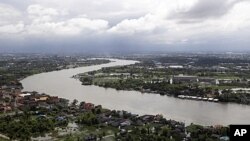As Bangkok residents scramble to prepare for long-awaited flooding, communities in low-lying areas are bracing for the worst. Preparations in the impoverished riverside slum of Klong Toey, are underway. Community organizers are scrambling to evacuate the elderly and the young.
Klong Toey is located at the main city port on the banks of the Chao Phraya River that is now running at record high levels.
City officials are warning that the river that courses through the center of the capital will overflow its banks sometime in the coming hours.
Thongchai Parawat, an aid worker assisting the disabled at an Aids hospice and community welfare center, says people in the community are fearful and anxious.
Thongchai says access to food and knowing where to evacuate to when the floods hit are the main concerns of the local community. He says the flooding is the most severe disaster to hit the community in over 50 years.
Prapai Sanusan, is a social welfare worker in this community of some 170,000 people. She says many conflicting announcements by authorities in recent days have led to increasing anxiety.
Now volunteers are planning to move the elderly and young to nearby schools and public buildings. Others are doing what they can to try to lessen the damage.
Prapai says some people are going too close to the locations where flooding is already occurring. While in Klong Toey residents are clearing drains of plastic and other rubbish in a bid to speed up the outflow of water.
Food prices have soared in recent days in the capital following panic-buying sprees. The price of a dozen eggs has more than doubled. The rises led the Commerce Ministry to add 16 items to those under state price controls including drinking water, water pumps and candles.
While the flood waters could last for a month or longer in some parts of the city, community organizers say they are worried about the longer term economic impact.
Flooded factories in the north of the country have suspended operations, leading to tens of thousands of workers now searching for a new job. Thongchai says many here are worried about the same thing.
Thongchai says the people are agitated and frightened and deeply anxious because they will not know if their employer will still have a job for them in the future.
The floods are expected to cost the Thai economy in excess of $6 billion with over 600,000 jobs lost, especially among skilled workers in over a dozen major industrial states inundated by the floods.
Hundreds of thousands of temporary employees, including migrant workers largely from Burma, have lost their jobs and been forced to return home. For communities such as Klong Toey the economic anxieties will remain long after the floods recede.






